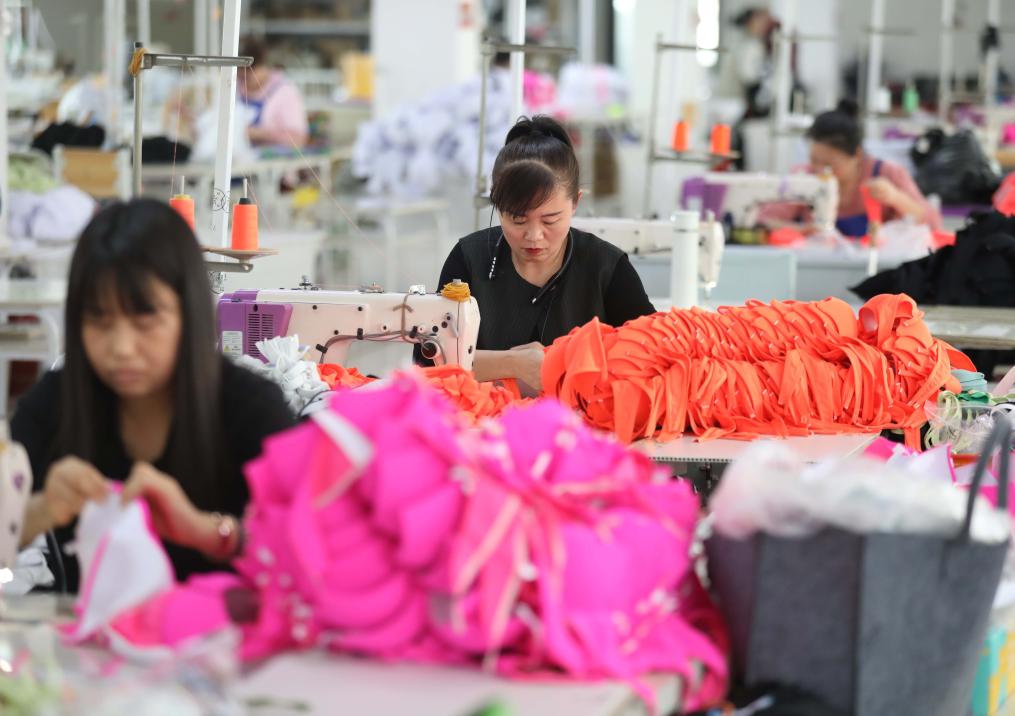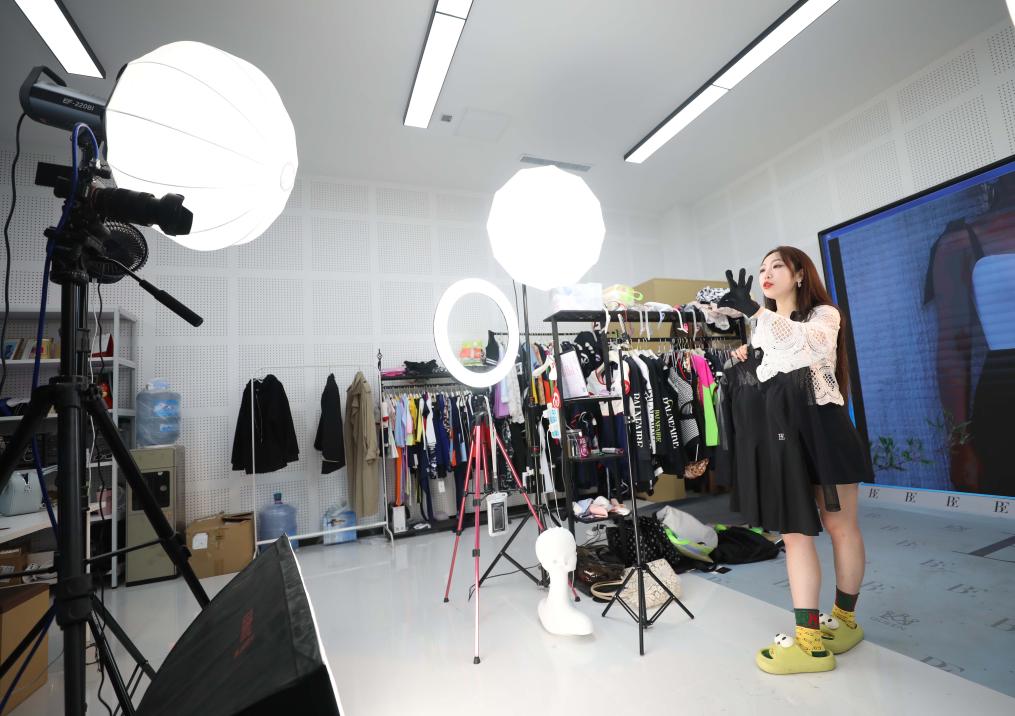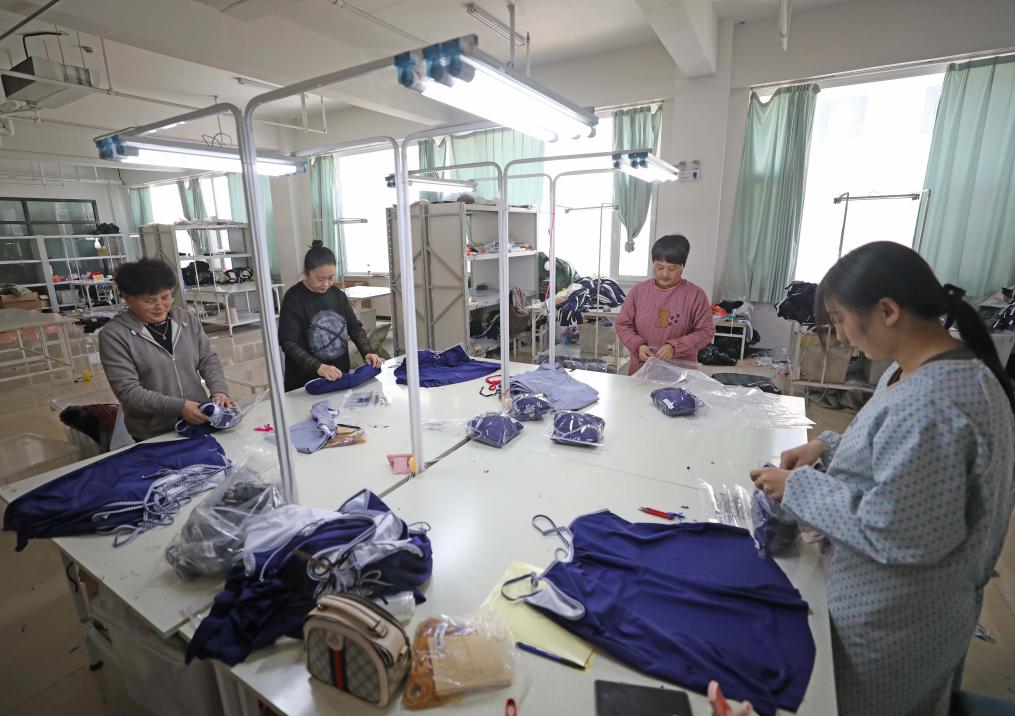




- BRNN
- BRI News
- BRNN News
- Database
Official Documents Polices and Regulations
Inter-government Documents International Cooperation BRI Countries
Business Guide Economic Data BRI Data
Trade
Investment Projects Latest projects
Cases - Content Pool
Xingcheng, a coastal city in northeast China's Liaoning Province, with a population of less than 500,000, produces one out of every four swimming suits sold globally.
The swimwear industry in Xingcheng took off in the 1980s when locals noticed tourists having fun on the beach in colorful swimming suits. Intrigued and seeing potential, some residents bought suits, studied them, and began making their own.
During that time, crafting a single swimming suit brought in one yuan (approximately $0.14) in revenue, and a woman could produce around 30 suits daily. Contrasted with the meager monthly income of about 60 yuan from factory work, locals soon recognized the profitability of making swimming suits.

Workers make swimming suits in the production workshop of a swimwear company in Xingcheng, northeast China's Liaoning Province, on April 18, 2024. (Xinhua/Yang Qing)
Today, approximately one-third of Xingcheng's population is involved in swimwear manufacturing and related occupations. The city boasts over 1,300 swimwear manufacturers, collectively producing an average of around 170 million pieces annually, representing over 40 percent of the national total and 25 percent of the global total. The annual output value of the swimwear industry in Xingcheng amounts to 15 billion yuan.
Today, delivery vehicles from different express delivery companies can be seen on the streets in Xingcheng, transporting locally made swimming suits to destinations across the country and even to foreign markets such as the U.S., Thailand, and Australia.
Haocheng Garment Co., Ltd., based in Xingcheng, manufactures swimming suits and distributes them globally through cross-border e-commerce platforms.
Tian Shu, the company's general manager, said over 90 percent of the company's sales come from overseas. Besides traditional foreign trade channels, the company also utilizes cross-border e-commerce to expand its international trade.
Tian, a third-generation member of a family involved in the production of swimming suits, said that his 88-year-old grandmother is one of the pioneers in making swimming suits in the city. While his grandmother crafted swimming suits using a sewing machine, his parents established a swimwear factory.

A salesperson hosts a live-streaming session to sell swimming suits at a swimwear company in Huludao, northeast China's Liaoning Province, on April 18, 2024. (Xinhua/Yang Qing)
The internet has facilitated the evolution of the swimwear industry in Xingcheng, enabling local manufacturers to distribute their products globally through e-commerce platforms.
Presently, the swimwear industry in Xingcheng is undergoing a digital transformation. Data shows that over 30 percent of the more than 33,000 production equipment used in the industry are imported, with a prevalent use of automated and advanced machinery. More than 90 percent of companies above designated size utilize digital cutting machines, fabric spreading machines, and digital printing equipment. Additionally, some companies have implemented comprehensive swimwear production management systems.

Workers make swimming suits in the production workshop of a swimwear company in Xingcheng, northeast China's Liaoning Province, on April 18, 2024. (Xinhua/Yang Qing)
In driving industrial transformation and advancement, it is vital for industry leaders to set the standard and serve as benchmarks.
Traditional Chinese culture is even finding its way into swimsuit production. In the exhibition area of Yinghua Swimwear Clothing Co., Ltd. in Xingcheng, several stunning Chinese-style swimwear pieces inspired by the Qipao, a traditional Chinese dress for women, are on display.
According to Wang Na, president of the company, the company is committed to high-end product design, with swimwear materials, designs, and manufacturing rivaling those of top international brands. The company has registered trademarks in multiple countries and has become a representative of Xingcheng's push toward high-end market transformation in the swimwear industry.
"For Xingcheng swimwear, only by increasing product's added value, improving efficiency through smart technologies, and capturing high-end markets can we enhance the industry's core competitiveness. This is the foundation for the sustainable development of this small-town powerhouse," said Wei Dongsheng, Party secretary of the Xingcheng municipal bureau of industry and information technology.

Tel:86-10-65363107, 86-10-65368220, 86-10-65363106